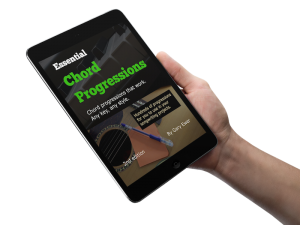When you listen to the songs you’ve written, can you hear your personality coming through? I’m not talking about the performance of your song; in good musical performances we usually find it easy to hear and feel the personality of the performer.
 “Use Your Words! Developing a Lyrics-First Songwriting Process” is FREE with your purchase of “The Essential Secrets of Songwriting 10-eBook Bundle. $37 USD. Immediate Download.
“Use Your Words! Developing a Lyrics-First Songwriting Process” is FREE with your purchase of “The Essential Secrets of Songwriting 10-eBook Bundle. $37 USD. Immediate Download.
I’m talking more about your personality being evident in the actual music of your song, such that if someone else records it, we still hear a bit of “you.”
This may be an aspect of songwriting you haven’t thought about much, but it is certainly worth the time to take a few older songs that you’ve written, and listen to them purely from a structural — not a performance — point of view.
A few examples might help you see what I’m talking about:
- When I listen to “Old Man”, “Heart of Gold”, and “Keep On Rockin’ in the Free World”, it’s not hard for me to get a clear picture of Neil Young the man. I hear his opinions, the way he phrases things, the kinds of thoughts he has.
- When I listen to “Come Together”, “In My Life” and “A Day In the Life”, I get a very clear sense of everything from the thoughtful to the quirky and humorous lyrical style of John Lennon.
- When I listen to “Glory Days”, “Born to Run” and “Streets of Philadelphia”, I can easily hear the earthy, grassroots kind of perspective that Bruce Springsteen shows in his music.
And of course, I’m mostly talking about the lyrics here, but in all good songs, the music must support those lyrics, and allow their meaning, their point of view, and then the personality of the songwriter to be clearly evident.
If I have any criticism of today’s popular music, it might be that it’s becoming harder for me to hear that kind of perspective in songwriting right now. It may be that so much of what becomes hits these days has been written “by committee.” There’s nothing particularly wrong with songwriting partnerships, but when six, seven or more songwriters are all credited with writing a song, it makes it harder to hear the kind of personality I’m talking about.
I truly believe that personality is a vital part of the formula that makes it more likely that people will still be singing your songs 50 or more years from now.
So take the time to listen to your songs, and try to identify — if you can — what parts of your song sound like you. What parts allow your personality to become evident, no matter who eventually sings them.
 Written by Gary Ewer. Follow Gary on Twitter.
Written by Gary Ewer. Follow Gary on Twitter.
 Looking for lists of progressions you can use in your own songs? “The Essential Secrets of Songwriting” eBook Bundle has 2 main collections, plus eBooks on how to harmonize your own melodies, and more.
Looking for lists of progressions you can use in your own songs? “The Essential Secrets of Songwriting” eBook Bundle has 2 main collections, plus eBooks on how to harmonize your own melodies, and more.










